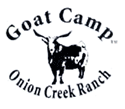November 2013 Issue |
||||||||
 |
||||||||
IN THIS ISSUE: |
||||||||
• Subscribe to Meat Goat Mania • Email Us • Onion Creek Ranch • Bending Tree Ranch • OCR Health & Management Articles • MGM Archive |
||||||||
HAY TESTING: WHY IT IS IMPORTANT The year 2004 was unusually wet for normally dry West Texas. Forage/browse and pastures were lush and green by our standards, so I decided to feed my goats on forage/pasture with minimal use of sacked feed. I fed free-choice sudangrass hay that had been custom raised for me and Sweetlix protein/mineral blocks. As fall approached, goats, especially kids, started losing weight and getting wormy. I seldom have worm problems with my goats (the result of a usually very dry climate, heavy culling, and lots of acreage for them to roam and eat), so I was concerned. Goat nutritionist Kent Mills of HiPro Feeds came to my rescue. Hay was sampled and sent for testing. The results were eye-opening: 4.9% protein (4.4% protein "as fed"). The hay was beautiful to look at but nutritionally worthless. Thankfully, the ENERGY measure was .53, allowing grown goats to maintain their body weights but starving the fast-growing kids. Mr. Mills developed a nutritional program for my goats' specific needs. I found a local source of red-top cane (sudangrass) and began feeding it. This hay producer had tested her product: 10.75% protein, .68 Energy, and 65.62% TDN (Total Digestible Nutrients). For forage/pasture animals, Hi Pro's 20% protein all natural (no urea a/k/a non-protein nitrogen) sheep-and-goat blocks were offered free choice to provide supplemental protein. These 33-pound blocks do not have sufficient copper and other minerals for goats, but they are soft and therefore easy-to-eat and highly-digestible. One sheep-and-goat 20% protein block per 10 goats was provided. See the nutrition articles on www.tennesseemeatgoats.com <http://www.tennesseemeatgoats.com> to learn about these protein blocks and why they are the only product which I use that has the word "sheep" on the label. Loose Sweetlix-brand minerals made for goats were offered free choice; I quit using hard mineral blocks which goats cannot bite, therefore damaging their teeth. The loose minerals have sufficient salt, so no separate salt source was provided. Between January 7, 2005 and March 7, 2005, I fed 14 tons (68 blocks per ton) of sheep-and-goat blocks to about 1000 goats. For goats in large pens without pasture access, I fed HiPro's "Excelerator" 16% protein pelleted goat feed daily. When spring finally arrived, the goats began slowing down on hay and protein block consumption. The protein blocks were, however, provided free choice until the pastures dried out and the plant materials had more available nutrition and less water in them. As this problem was being recognized at Onion Creek Ranch, I was getting calls and emails from producers around the country who were having similar problems. One lady said that she had lost five young bucks for no apparent reason. Her husband cut them open and the rumens were filled with undigested hay and plant materials. What had gone wrong? The goats were not receiving enough protein or energy in their diets to produce microbes that would break down the fiber in their rumens, so they were starving to death on a full stomach. If goats cannot digest the plant materials they are eating, they will die. If the ADF (acid detergent fiber) is above 39, the plant material is not digestible. This is only one of the measurements you need to know about your hay (and forage in your pastures). I learned that much of the United States received higher than normal levels of rainfall in 2004, resulting in plant materials with higher water content and lower than normal nutritional values. My long-time hay supplier did everything that he normally did, including fertilizing the crop, but heavy rains leached fertilizer and nutrients from the crop. THE TAKE-AWAY: Top-quality hay is the FOUNDATION of your feeding program. Always have it professionally tested. I managed to get by for many years without testing hay, but the winter of 2004-2005 was a nutritional disaster. If you are fortunate enough to have sufficient forage and don't have to feed hay, have the forage tested every year. Conditions change from year to year that require modifications to your feeding program. Nothing is more complicated or more important in raising goats in any MANAGED goat-raising operation than proper nutrition. "Managed" applies to almost of all of us who are raising goats in the USA. Very few producers have enough land containing nutritious forage/browse to be able to raise goats without any input. If you are not a trained livestock nutritionist, never mix your own feed. Doing so messes up the nutritional balance formulated by trained nutritionists. See my article on this topic on the Articles page at www.tennesseemeatgoats.com <http://www.tennesseemeatgoats.com> . Consult a qualified goat nutritionist and have your feed program evaluated and forage/pastures tested. It isn't expensive and goat nutritionists are not that hard to find. They don't have to be local, but it is better. Search the Internet or call the feed company that formulates and manufactures your goat feed. There are numerous forage testing labs around the country. My goat nutritionist uses and recommends DAIRY ONE INC's Foraging Testing Lab, 730 Warren Road, Ithaca, New York 14850. Telephone number 607-257-1272 . Most labs provide collection packets for mailing with instructions on how to collect the samples. Cost to test hay and forage ranges from $18 to $54 in November 2013. You cannot come anywhere close to buying a single quality goat for that amount of money. Suzanne W. Gasparotto, Onion Creek Ranch, Texas 11/7/13 |
||||||||||||||||||||||||||||||||||||||||||||||||||||||||||||
|
||||||||||||||||||||||||||||||||||||||||||||||||||||||||||||
|
||||||||||||||||||||||||||||||||||||||||||||||||||||||||||||||||||||||||||||||||||||||||||||||||||||||||||||||||||||||||||||||||||||||||||||||||||||||||||||||||||||||||||||||||||||||||||||||||||||||||||||||||||||||||||||||||||||||||||||||||||||||||||||||||||||||||||||||||||||||||||||||||||||||||||||||||||||||||||||||||||||||||||||||||||||||||
|
||
|
||||||||||||||||||||||||||||||||||||||||||||||||||||








